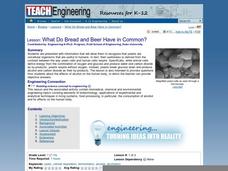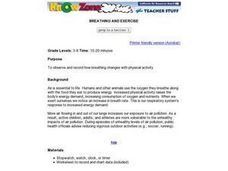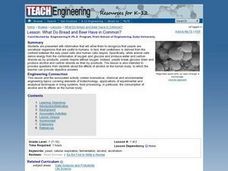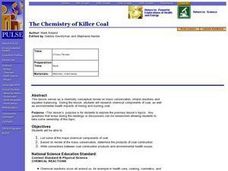University of Texas
What Are Calories?
What are calories, and how do calorie needs differ from person to person? Here is a worksheet that briefly explains how calories measure the energy supplied by food, as well as suggests the amount of food an individual should eat per day.
Curated OER
Energetic Energy: A Child?s Guide to Responsible Energy Use
Students explore how energy transforms into heat. In this energy instructional activity students create models and find a need for fuel to make a Stirling engine.
Curated OER
Electricity - How it Works and How We Measure and Pay For It
Students investigate energy consumption by researching wattage. In this electricity lesson, students discuss how electricity works and gets transferred to our electronic devices through generators and circuits. Students examine their...
Virginia Department of Education
Heat Transfer and Heat Capacity
It's time to increase the heat! Young chemists demonstrate heat transfer and heat capacity in an activity-packed lab, showing the transitions between solid, liquid, and gaseous phases of materials. Individuals plot data as the changes...
Curated OER
Sustainable Choices
High schoolers examine energy use and the different construction materials used in their home. In this sustainable choices lesson students study different materials and what a sound environmental choice would be.
Polar Trec
Calorimetry Lab
Young people between the ages of 11–13 need on average about 2,000 calories per day. Within the lab, groups learn about calorimetry and respiration. They explore how it pertains to humans and animals living the Arctic where cold...
Serendip
Should You Drink Sports Drinks? When? Why?
New research proves even rinsing your mouth with carbohydrates without swallowing improves performance of the central nervous system. While some think sports drinks are amazing, others say they are a waste of money. Scholars learn about...
Curated OER
What Do Bread and Beer Have in Common?
Young scholars listen to an explanation of yeast cells and how they effect bread and beer. They discuss the ways alcohol affects the human body and participate in an indirect observation about cell respiration in yeast-molasses cultures.
Curated OER
The Chemistry of Coal
Young scholars investigate the chemistry of coal. This lesson serves as a review of conservation of mass, simple reactions and equation balancing. During the lesson, students research chemical components of coal, as well as environmental...
Calvin Crest Outdoor School
Survival
Equip young campers with important survival knowledge with a set of engaging lessons. Teammates work together to complete three outdoor activities, which include building a shelter, starting a campfire, and finding directions in the...
Curated OER
Breathing Rates and Exercise
Young scholars work in groups to predict which condition produces more breaths per minute. Groups record their breathing rates during rest periods and periods of activity. They graph their results and make comparisons to their...
Curated OER
Calorie Countdown
Learners identify the advantages of a healthy diet and exercise plan. In this health lesson, students bring in labels of different food products and calculate the amount of calories each serving is. Learners keep a food diary to keep...
Curated OER
Breathing and Exercise
Learners observe and record how breathing changes with physical activities. In this physical activity lesson students form groups and complete their activity and worksheets.
Curated OER
Science: Comparing Beer and Bread
Students compare and contrast cellular respiration in yeast and plant and animal cells. After discovering the role of yeast in making beer and bread, they describe the short and long term effects of alcohol on the nervous and digestive...
Curated OER
Secrets of the Ocean Realm - Survival in the Sea
Middle schoolers determine the sequential links in a marine food chain and identify the roles that various organisms play in this chain. Students develop charts as visual aids for illustrating marine food chains.
Curated OER
Training for Three: Triathlon
Students complete a final exercise test (cycle ergometer) that enable them to discuss their potential in each of the three events. They are introduced to the concepts of economy and efficiency in running, swimming and cycling.
Curated OER
Grains, Fats, and Sugars in Healthy Proportions - Skill
Students investigate dietary guidelines and the food guide pyramid. They prepare various versions of pasta and muffins, and compare the taste, calories, fat, and cholesterol content.
Curated OER
Dissolved Oxygen Lesson
Pupils investigate what dissolved oxygen is and why it is important to aquatic life and what factors influence levels of dissolved oxygen in a lake. They study how to use MS Excel to make charts to show trends and correlations.
Curated OER
The Chemistry of Killer Coal
Learners research chemical components of coal, as well as environmental health impacts of mining and burning coal. They discuss conservation of mass as it relates to combustion of organic compounds.




















